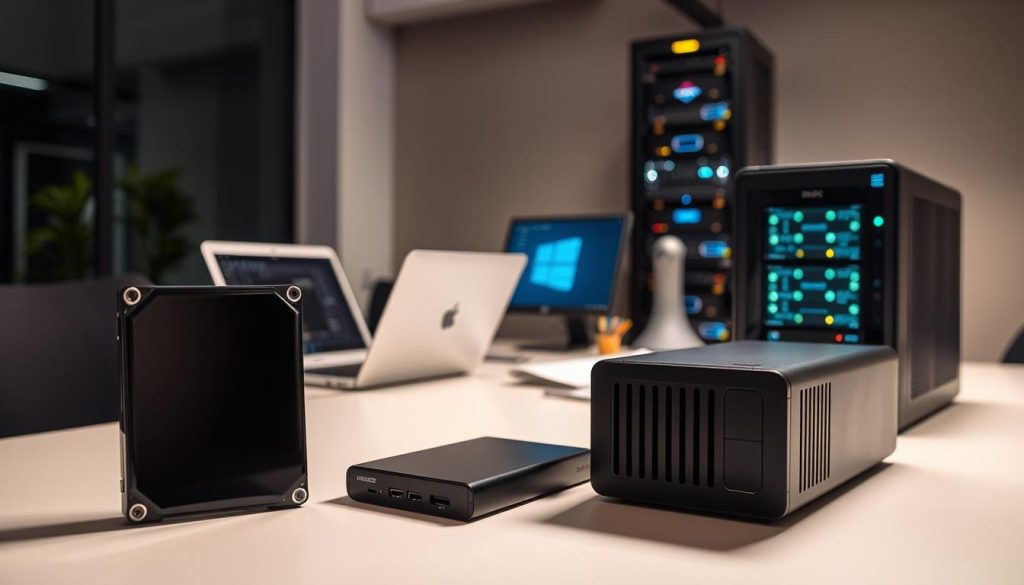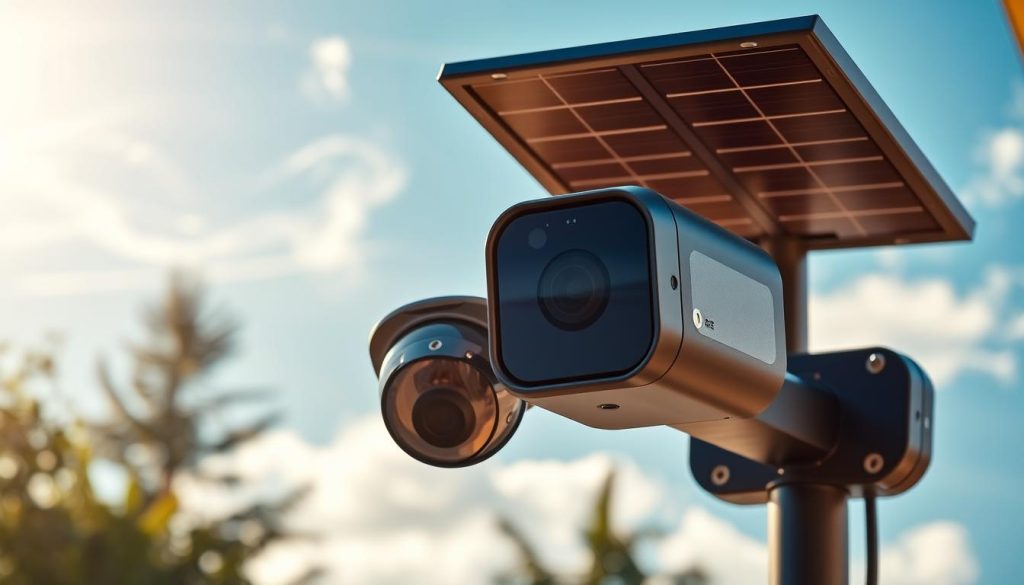In Singapore’s fast-paced urban environment, reliable surveillance is essential. Solar-powered monitoring solutions are gaining popularity due to their efficiency and eco-friendly benefits. These devices offer seamless operation, even in tropical climates, making them ideal for local needs.
Hikvision leads the industry with its advanced technology. Their models can run for seven days without sunlight, ensuring uninterrupted protection. The 40W solar panels recharge a 15Ah battery in just 7.5 hours, saving energy and reducing costs.
Singapore’s push for green initiatives aligns perfectly with these innovations. By minimizing infrastructure expenses and supporting sustainability, solar-powered surveillance is a smart choice. For the latest deals, contact ED Viston at +65 8313 4578.
Key Takeaways
- Solar-powered surveillance suits Singapore’s tropical climate.
- Hikvision cameras operate for seven days without sunlight.
- 40W solar panels recharge batteries in 7.5 hours.
- Reduces costs while supporting green initiatives.
- Reliable 4G connectivity ensures consistent performance.
How 4G Solar Security Cameras Work
Harnessing sunlight and cellular networks, these devices redefine outdoor monitoring. They combine renewable energy with cutting-edge technology to deliver reliable performance in any environment.
The Solar Power Advantage
Photovoltaic panels convert sunlight into DC electricity, stored in high-capacity battery units. A 40W panel can fully recharge a 15Ah battery in 7.5 hours, even under Singapore’s occasional cloud cover.
4G Connectivity Explained
Using Micro/Nano SIM cards, these cameras connect to local networks like SingTel, M1, or StarHub. Unlike Wi-Fi, 4g connectivity ensures stable transmission in urban areas with signal interference.
Key Components of the System
- Solar panels: 40W efficiency for optimal power generation.
- 9,400 mAh battery (e.g., eufy S330) for extended operation.
- IP67-rated housing to withstand tropical weather.
- Hikvision’s ColorVu technology enhances low-light visibility.
Data plans should align with usage—typically 5–10GB/month for continuous streaming. This balance of energy independence and 4g connectivity makes solar-powered systems a future-proof choice.
Why Singapore Needs Solar-Powered Surveillance
Singapore’s unique environment creates ideal conditions for solar-powered surveillance. The city-state’s equatorial location delivers 5.4 kWh/m²/day of sunlight, outperforming temperate regions in energy generation. This makes solar panels highly efficient despite frequent rain.
Tropical Climate Benefits
Singapore’s 167 rainy days yearly pose no major hurdle. High-quality panels harness sunlight even during brief dry spells. Compared to traditional CCTV, solar systems avoid overheating in urban heat islands.
Urban Security Challenges
HDB estates and construction sites face vandalism risks. Solar-powered units, often wireless, reduce tampering by eliminating exposed wiring. Their independence from networks ensures reliability during outages.
Government Green Tech Support
BCA’s Green Mark scheme incentivizes sustainable tech adoption. Projects using solar surveillance gain certification perks. NEA’s 2030 targets further push energy-efficient infrastructure, like Changi Airport’s solar deployment.
- Solar efficiency is 20% higher here than in temperate zones.
- Rain-resistant designs maintain power output during monsoons.
- URA mandates Green Mark compliance for new buildings.
Essential Features of 4G Wireless Solar Cameras
Key specifications determine the effectiveness of eco-friendly surveillance devices. From battery capacity to AI analytics, each component impacts performance in Singapore’s tropical climate.
Power Management and Charging
Solar panels and batteries form the backbone of off-grid systems. The Reolink Argus 3 Pro’s 6,400 mAh battery capacity supports 24/7 operation when paired with a 5W panel. For extreme heat resistance, LiFePO4 batteries outperform Li-ion in longevity.
Efficient charging requires matching panel wattage to energy needs. A 40W panel replenishes a 15Ah battery in 7.5 hours—ideal for Singapore’s 5.4 kWh/m² daily sunlight average.
Imaging Performance
Video clarity hinges on sensor quality and resolution. The Arlo Pro 4 delivers 2K HDR footage, while EZVIZ EB8’s 4MP sensor captures 100° views. Night vision depends on lux ratings; 0.001 lux enables starlight-mode clarity.
Smart Detection Systems
Advanced motion detection reduces false alerts. Hikvision’s DeepinView models use AI zoning to distinguish humans from foliage. Pixel-based analysis achieves 98% accuracy versus PIR sensors’ 85% in humidity.
- Storage options: 4K footage consumes 20GB/day vs 7GB for 1080p
- Cloud backups provide remote access during local outages
- Hybrid systems support SD cards and NAS drives
For optimal setups, explore our guide to solar-powered outdoor cameras with real-time analytics.
Top 4G Wireless Security Camera Solar Models Available in Singapore
Singapore’s tech-savvy homeowners now have cutting-edge surveillance choices. Three brands dominate the market with weatherproof designs and AI-driven features. Each model balances power efficiency with tropical durability.
Hikvision Solar-Powered Series
The Hikvision DS-2XS2T47IW-IT3 excels in advanced detection. Its thermal imaging spots intruders through foliage, while 4MP ColorVu ensures vivid night footage. A 40W solar panel sustains operation during monsoon seasons.
- Warranty: 3 years, covering humidity damage.
- Unique perk: Geo-fencing triggers alarms for unauthorized movement.
Reolink 4G LTE Solar Options
For versatility, the Reolink Go PT offers 355° panning and dual 5GHz/4G modes. It withstands -20°C to 55°C, ideal for rooftop installations. Local carriers like M1 and StarHub support its sim card slot.
- Price: S$399, the most budget-friendly.
- Data use: ~7GB/month for 1080p streaming.
Eufy Solar 4G Camera Solutions
The Eufy S330 boasts a 9,400mAh battery—largest in its class. Its 4K resolution captures license plates 50 feet away. A 13W solar panel fully recharges the system in 12 hours.
- Theft prevention: Tamper alerts notify owners if the unit is moved.
- Warranty: 2 years, extendable for tropical conditions.
All models comply with Singapore’s Green Mark standards, blending sustainability with robust security. For tailored advice, consult local installers.
Installation Tips for Maximum Efficiency
Proper setup ensures your surveillance system performs at its best in Singapore’s climate. Strategic placement and weather-resistant solutions optimize energy capture and connection reliability. Follow these guidelines to enhance performance outdoors.
Optimal Solar Panel Positioning
Angle solar panels at 1.35° north to match Singapore’s latitude. Use NEA’s solar path charts to track the sun’s movement across seasons. This maximizes exposure during peak day hours.
Mount panels away from shade—even partial coverage reduces efficiency by 50%. For HDB walls, use corrosion-resistant brackets rated for concrete.
4G Signal Strength Considerations
Check IMDA’s coverage maps before installation. Areas with weak connection may need signal boosters. Place devices near windows for better reception in basements.
Test SIM cards from SingTel or StarHub for compatibility. Avoid metal obstructions that disrupt cellular networks.
Weatherproofing for Tropical Conditions
Singapore’s monsoons demand IP67-rated housings and waterproof junction boxes. Secure cables with UV-resistant conduits to withstand 35°C averages.
- Mount units under rain gutters to deter theft.
- Clean panels monthly to prevent dust buildup.
- LiFePO4 batteries handle humidity better than standard models.
Comparing Storage and Connectivity Options
Effective monitoring depends on smart data handling and network choices. Singapore’s hybrid urban-rural landscape demands flexible storage and reliable service. This guide breaks down local solutions and carrier performance.
Local vs Cloud Storage Solutions
On-device storage uses SD cards (U3/V30-rated for 4K). A 128GB card holds ~3 days of continuous 1080p footage. For tropical durability, choose waterproof models like SanDisk Extreme.

Cloud storage offers remote access but requires stable data. EZVIZ CloudPlay costs S$9.90/month with PDPA-compliant encryption. Motion-triggered recording cuts usage by 60% versus 24/7 streaming.
Singapore Carrier Compatibility
All major carriers support 4G sim card slots. SingTel delivers the lowest latency (28ms), ideal for real-time alerts. StarHub and M1 cover rural areas like Lim Chu Kang with 35ms response times.
Data Usage and Plan Recommendations
1080p streaming consumes ~7GB/month, while 4K needs 20GB. For 24/7 monitoring, opt for 100GB+ plans:
- SingTel: S$20/month (50GB), expandable
- Circles Life: S$18/month (100GB, prepaid)
- M1: S$25/month (120GB, postpaid)
“Prepaid sim cards suit seasonal use, while postpaid plans ensure uninterrupted service.”
Maintenance and Troubleshooting Guide
Proper upkeep boosts performance and prevents common issues with surveillance setups. Follow these steps to ensure reliability in Singapore’s humid climate.
Solar Panel Care
NEA recommends cleaning solar panels every 30 days. Dust reduces efficiency by 15%. Use a soft cloth and mild detergent to avoid scratches.
Battery Health Checks
Monitor battery voltage monthly. A 12V system should read 12.6V when fully charged. Hikvision’s dashboard tracks cycle counts—replace after 500–800 cycles.
Connectivity Fixes
For connectivity drops, verify APN settings match your carrier (e.g., M1’s “sunsurf”). Test SIM cards in other devices to rule out signal issues.
- Schedule monsoon prep: Seal connectors with dielectric grease.
- Reduce false detection by adjusting motion zones.
- Contact ED Viston at +65 8313 4578 for professional servicing.
For more tips, explore our guide to solar-powered outdoor cameras.

